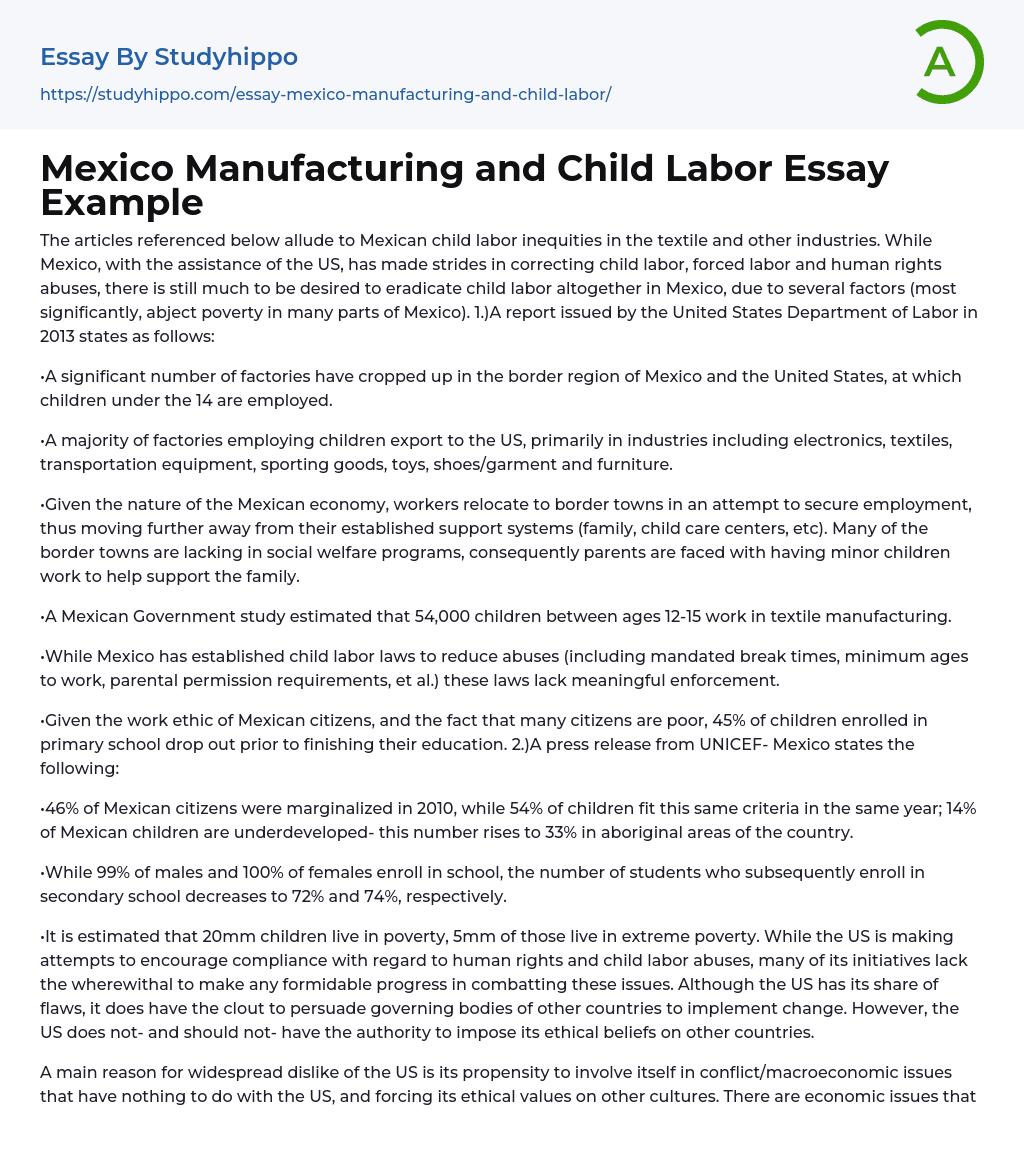The articles referenced below allude to Mexican child labor inequities in the textile and other industries. While Mexico, with the assistance of the US, has made strides in correcting child labor, forced labor and human rights abuses, there is still much to be desired to eradicate child labor altogether in Mexico, due to several factors (most significantly, abject poverty in many parts of Mexico). 1.)A report issued by the United States Department of Labor in 2013 states as follows:
•A significant number of factories have cropped up in the border region of Mexico and the United States, at which children under the 14 are employed.
•A majority of factories employing children export to the US, primarily in industries including electronics, textiles, transportation equipment, sporting goods, toys, shoes/garment and furniture.
•Given the nature of the M
...exican economy, workers relocate to border towns in an attempt to secure employment, thus moving further away from their established support systems (family, child care centers, etc). Many of the border towns are lacking in social welfare programs, consequently parents are faced with having minor children work to help support the family.
•A Mexican Government study estimated that 54,000 children between ages 12-15 work in textile manufacturing.
•While Mexico has established child labor laws to reduce abuses (including mandated break times, minimum ages to work, parental permission requirements, et al.) these laws lack meaningful enforcement.
•Given the work ethic of Mexican citizens, and the fact that many citizens are poor, 45% of children enrolled in primary school drop out prior to finishing their education. 2.)A press release from UNICEF- Mexico states the following:
style="text-align: justify">•46% of Mexican citizens were marginalized in 2010, while 54% of children fit this same criteria in the same year; 14% of Mexican children are underdeveloped- this number rises to 33% in aboriginal areas of the country.
•While 99% of males and 100% of females enroll in school, the number of students who subsequently enroll in secondary school decreases to 72% and 74%, respectively.
•It is estimated that 20mm children live in poverty, 5mm of those live in extreme poverty. While the US is making attempts to encourage compliance with regard to human rights and child labor abuses, many of its initiatives lack the wherewithal to make any formidable progress in combatting these issues. Although the US has its share of flaws, it does have the clout to persuade governing bodies of other countries to implement change. However, the US does not- and should not- have the authority to impose its ethical beliefs on other countries.
A main reason for widespread dislike of the US is its propensity to involve itself in conflict/macroeconomic issues that have nothing to do with the US, and forcing its ethical values on other cultures. There are economic issues that citizens abroad are faced with that force the need for minors to work to help support their families. The US should become involved in enforcing child labor laws with countries they have trade agreements with, or that export to the US. Trade agreements should be established under the strict guidelines set forth by the US with regard to its expectations on human rights and child labor issues; subsequently, the US needs to have supervision standards in
place to enforce these guidelines and be prepared to sever business ties with countries that deviate from the US standard for fair labor.
It is difficult to say how the US consumer can counterbalance the need for cheap goods while being socially responsible; the US consumer functions on the basis of gratification and will not sacrifice cheap goods. However, consumers can elect legislators that will follow through on enforcing fair labor laws and social responsibility, and enacting laws with ‘teeth’. If the US intends to continue doing business with countries utilizing child labor, it is its responsibility to ensure that these children are properly treated and protected from abuses. In doing so, the US must be prepared to cease business with countries that do not comply with fair labor practices.
- Factory essays
- Material essays
- Production And Manufacturing essays
- Alarm clock essays
- Child essays
- Child labor essays
- Childcare essays
- Affirmative Action essays
- Assisted Suicide essays
- Capital Punishment essays
- Censorship essays
- Child Labour essays
- Child Protection essays
- Civil Rights essays
- Corporal Punishment essays
- Death Penalty essays
- Empowerment essays
- Euthanasia essays
- Gay Marriage essays
- Gun Control essays
- Human Trafficking essays
- Police Brutality essays
- Privacy essays
- Sex Trafficking essays
- Speech essays
- Career essays
- Career Path essays
- Homeless essays
- Labour Economics essays
- Occupational Safety And Health essays
- Pension essays
- Profession essays
- Salary essays
- Strike Action essays
- Wage essays
- Working Together essays
- Workplace essays
- Accounting essays
- Andrew Carnegie essays
- Automation essays
- Business Cycle essays
- Business Intelligence essays
- Business Model essays
- Business Operations essays
- Business Software essays
- Cooperation essays
- Cooperative essays
- Corporate Social Responsibility essays
- Corporation essays
- Customer Relationship Management essays


Unfortunately copying the content is not possible
Tell us your email address and we’ll send this sample there.
By continuing, you agree to our Terms and Conditions.


